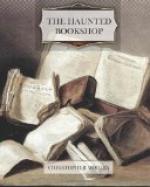It is more likely, however, that the student of phenomena would have continued along Gissing Street to the next corner, being that of Hazlitt Street. Taking advantage of opportunity, he would overtake the lady on the pavement, with a secret, sidelong glance. If he were wise, he would pass her on the right side where her tilted bonnet permitted a wider angle of vision. He would catch a glimpse of cheek and chin belonging to the category known (and rightly) as adorable; hair that held sunlight through the dullest day; even a small platinum wrist watch that might pardonably be excused, in its exhilarating career, for beating a trifle fast. Among the greyish furs he would note a bunch of such violets as never bloom in the crude springtime, but reserve themselves for November and the plate glass windows of Fifth Avenue.
It is probable that whatever the errand of this spectator he would have continued along Gissing Street a few paces farther. Then, with calculated innocence, he would have halted halfway up the block that leads to the Wordsworth Avenue “L,” and looked backward with carefully simulated irresolution, as though considering some forgotten matter. With apparently unseeing eyes he would have scanned the bright pedestrian, and caught the full impact of her rich blue gaze. He would have seen a small resolute face rather vivacious in effect, yet with a quaint pathos of youth and eagerness. He would have noted the cheeks lit with excitement and rapid movement in the bracing air. He would certainly have noted the delicate contrast of the fur of the wild nutria with the soft V of her bare throat. Then, to his surprise, he would have seen this attractive person stop, examine her surroundings, and run down some steps into a rather dingy-looking second-hand bookshop. He would have gone about his affairs with a new and surprised conviction that the Almighty had the borough of Brooklyn under His especial care.
Roger, who had conceived a notion of some rather peevish foundling of the Ritz-Carlton lobbies and Central Park riding academies, was agreeably amazed by the sweet simplicity of the young lady.
“Is this Mr. Mifflin?” she said, as he advanced all agog from his smoky corner.
“Miss Chapman?” he replied, taking her bag. “Helen!” he called. “Miss Titania is here.”
She looked about the sombre alcoves of the shop. “I do think it’s adorable of you to take me in,” she said. “Dad has told me so much about you. He says I’m impossible. I suppose this is the literature he talks about. I want to know all about it.”
“And here’s Bock!” she cried. “Dad says he’s the greatest dog in the world, named after Botticelli or somebody. I’ve brought him a present. It’s in my bag. Nice old Bocky!”
Bock, who was unaccustomed to spats, was examining them after his own fashion.
“Well, my dear,” said Mrs. Mifflin. “We are delighted to see you. I hope you’ll be happy with us, but I rather doubt it. Mr. Mifflin is a hard man to get along with.”




